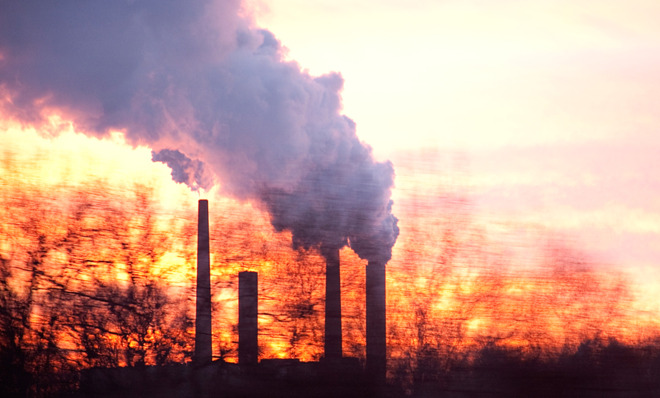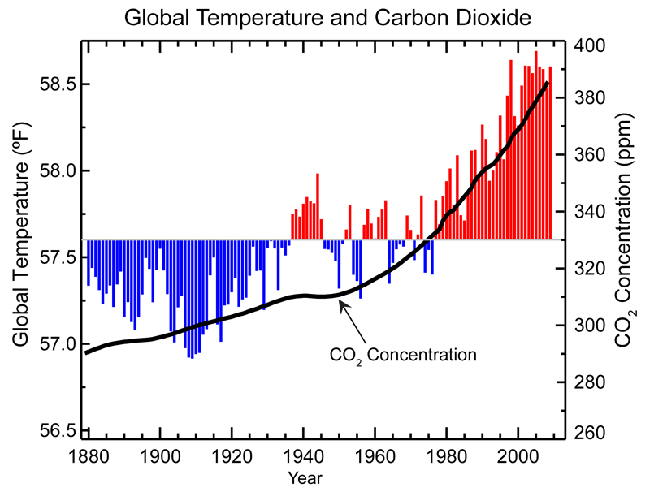To understand our climate future, look to the past
Our ancestors would deem our species' behavior recklessly suicidal

A free daily email with the biggest news stories of the day – and the best features from TheWeek.com
You are now subscribed
Your newsletter sign-up was successful
Modern human civilization is fragile — fragile to crop failures, droughts, and extreme weather. We are extremely susceptible to energy and water shortages. We don't fully understand complex, chaotic systems like Earth's climate. And yet, we are rapidly changing the composition of the atmosphere, even though the archeological record shows the difficulty that our ancestors had in adapting to previous rapid climate changes.
That seems suicidally reckless.
Man-made climate change is a massive problem — the species-threatening challenge of our time. And yet, most people struggle to grasp why it is so important. So let us consider for a moment the enormity of what we are destabilizing, the history of how we got to this point, and the cautionary tales from our planet's past.
The Week
Escape your echo chamber. Get the facts behind the news, plus analysis from multiple perspectives.

Sign up for The Week's Free Newsletters
From our morning news briefing to a weekly Good News Newsletter, get the best of The Week delivered directly to your inbox.
From our morning news briefing to a weekly Good News Newsletter, get the best of The Week delivered directly to your inbox.
Once climatologists noticed the rising trend in global temperatures, it didn't take long to connect the evidence of global warming to the activities of human beings. Without question, global temperatures are rising in step with levels of carbon dioxide and other greenhouse gases emitted into the atmosphere by human industry:

Plenty of other evidence — including rising sea levels, warming and acidifying oceans, shrinking ice sheets, declining sea ice, and declining glaciers — solidified this hypothesis, and man-made global warming is now accepted as fact by the vast majority of climate scientists.
But as you're surely aware, among the general population there is no such consensus on climate change. In a poll last year, just 49 percent of Americans understood that climate change is both real and man-made. And just 40 percent of Americans believe climate change is a major threat. In many ways, this is very understandable. The Earth's climate is enormous and multi-dimensional — well beyond the experience of any one human being. Global climate isn't just your local daily or weekly weather; it's the sum total of all global weather, everywhere on Earth. It's a difficult, abstract thing to understand.
To help us understand why this issue is so important, we ought to be looking to our planet's history. Modern humans have existed on the planet for more than 115,000 years. It took quite a long time to build a modern technological civilization. Why? Probably the greatest factor has been that we have had to learn slowly, by experience. But another very large factor has been the pressures exerted on humans by various non-man-made climactic events that would have resulted in crop failures, starvation, and forced migrations. In the last ice age — which lasted over 90,000 years, only ending 12,000 years ago — vast ice sheets extended to cover much of North America, northern Europe, and Asia. The Mount Toba supervolcano eruption of 71,000 years ago spewed out enough ash to cause a six-year volcanic winter.
A free daily email with the biggest news stories of the day – and the best features from TheWeek.com
A more extreme example occurred 55 million years ago. Known as the Paleocene-Eocene thermal maximum, global temperatures rose 6°C over a period of 20,000 years or so. Greenhouse gases — probably from a catastrophic release of frozen methane deposits — caused this rapid warming. This period of climate change resulted in major global changes and the extinction of many organisms and ecosystems.
Even non-man-made climactic events can be catastrophic for life on Earth. The lessons of our planet's history are clear in that regard. And yet, we as a species invite disaster, willfully turning our eyes from the past and destabilizing Earth's climate by pumping out huge quantities of greenhouse gases.
I wonder what the hunter-gatherers who survived through the onset of the last ice age would think of us willfully changing the climate by burning huge quantities of fossil fuels. I wonder what farmers whose crops were choked by year-long volcanic winters would think of us willfully unleashing millions of tons of carbon dioxide into the atmosphere. Most of us in the West, in our air-conditioned homes, cars, and offices, have no clue what climate change means. Our ancestors — huddled around a fire, picking meat from the bones of carcasses while an endless blizzard raged outside — might be able to tell us a lot about the demons we are willfully setting loose.
It needn't be this way. Unlike our ancestors, we have great control over our environment. It's not like burning fossil fuels is our only means to live in a modern, technological world. Renewable energy technologies like solar and wind exist, and their prices are already becoming competitive with fossil fuels. Switching to renewable energy is likely to be more of an economic gain than an economic cost. And there's also the carbon-free nuclear fission technologies that have existed for decades, including the relatively safer thorium reactors. There are even carbon scrubbers that can directly strip carbon dioxide out of the air, although these remain relatively expensive (a cheaper alternative would be stopping and reversing deforestation).
The accumulation of carbon dioxide in the atmosphere is a risk that our society has chosen to take because we can't (yet) be bothered to switch to renewable energy and take steps to begin to reduce atmospheric carbon dioxide back to safe pre-industrial levels, and keep it there. It's easier for many of us to shrug, sigh, or accuse scientists of lying and making up results. Apathy and denial reign supreme.
We know that there have been previous natural climactic cataclysms that we still don't fully understand — volcanic eruptions, glaciation, solar changes, meteor impacts. Such events, recreated today, would imperil modern human civilization as we know it. If we're going to survive as a technological species, we need to be able to adjust conditions to prevent not only dangerous man-made climate change, but other kinds as well.
John Aziz is the economics and business correspondent at TheWeek.com. He is also an associate editor at Pieria.co.uk. Previously his work has appeared on Business Insider, Zero Hedge, and Noahpinion.
-
 Why are election experts taking Trump’s midterm threats seriously?
Why are election experts taking Trump’s midterm threats seriously?IN THE SPOTLIGHT As the president muses about polling place deployments and a centralized electoral system aimed at one-party control, lawmakers are taking this administration at its word
-
 ‘Restaurateurs have become millionaires’
‘Restaurateurs have become millionaires’Instant Opinion Opinion, comment and editorials of the day
-
 Earth is rapidly approaching a ‘hothouse’ trajectory of warming
Earth is rapidly approaching a ‘hothouse’ trajectory of warmingThe explainer It may become impossible to fix